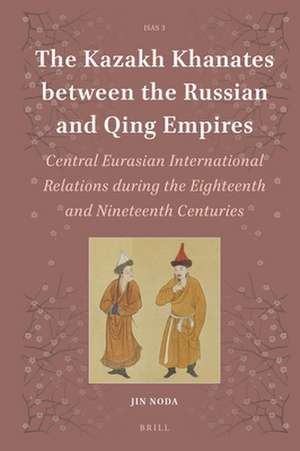The Kazakh Khanates between the Russian and Qing Empires: Central Eurasian International Relations during the Eighteenth and Nineteenth Centuries: Islamic Area Studies, cartea 3
Autor Jin Nodaen Limba Engleză Hardback – 6 apr 2016
Preț: 648.00 lei
Preț vechi: 790.24 lei
-18% Nou
Puncte Express: 972
Preț estimativ în valută:
124.01€ • 128.99$ • 102.38£
124.01€ • 128.99$ • 102.38£
Carte indisponibilă temporar
Doresc să fiu notificat când acest titlu va fi disponibil:
Se trimite...
Preluare comenzi: 021 569.72.76
Specificații
ISBN-13: 9789004314443
ISBN-10: 900431444X
Pagini: 352
Dimensiuni: 155 x 235 mm
Greutate: 0.64 kg
Editura: Brill
Colecția Brill
Seria Islamic Area Studies
ISBN-10: 900431444X
Pagini: 352
Dimensiuni: 155 x 235 mm
Greutate: 0.64 kg
Editura: Brill
Colecția Brill
Seria Islamic Area Studies
Cuprins
Acknowledgements
Notes on Transliteration and Sources
Abbreviations
List of Illustrations
Preface: The Kazakh Khanates’ Place within the Central Eurasian World
The History of the Kazakh Steppe and the Kazakh Khanates
Themes to Be Addressed
Methodology and Significance
Outline of Content
Description of Historical Sources
Part One: The ‘Kazakh Khanates’ and the History of the International Relations in Central Asia
1Reexamining the Kazakh Khanates’ ‘Foreign Relations in the East’
A History of Research Regarding the Kazakh Khanates
A History of Research Regarding the Kazakh-Qing Connection
Historical Relations between the Kazakh Steppe and Xinjiang: An analysis based on accounts in Tavārīḫ-i Ḫamsa-yi Šarqī, written by the Tatar imam Qurbān ‘Alī
2The Impact of Russian Advances into Central Asia on Kazakh-Russian Relations
The Petition for Russian Subject Status and an Oath on the Quran
The Kazakh Title of “Khan”
Establishment of the 1822 Regulation within the Middle Juz
Part Two: The Foundations of Kazakh-Qing Relations
3The Problem of Kazakh Subjection and the Russian-Qing Relationship in Central Asia
The Jungars and Central Asia within Russian-Qing Relations
The Toši Mission’s Proposals (1731) and Russia-Qing Negotiations
The Russian-Qing Negotiations of 1756–1758 Regarding Central Asia
4The Differing Nature of the Three Kazakh Juz and the Three “Bu” (Sections) Mentioned in Qing Historical Sources
Eighteenth and Nineteenth Century Kazakh Social Structure as Described within Qing Historical Sources
The Meaning of the Term “Hasake” within Qing Historical Records
Relations between the three Kazakh Juz and the Qing Empire
The Three Sections in the View of the Kazakhs
5Titles of Kazakh Sultans Bestowed by the Qing Empire: The 1824 Case of Sultan Ghubaidulla
Qing Titles for the Kazakhs
Sultan Ghubaidulla and his Han Title
Titles for Kazakhs Thereafter
Part Three: Russo-Qing Relations and the Fate of the Kazakh Khanates
6Kazakh Participation in the Russo-Chinese Trade of Central Asia
The Kyakhta Trade and Russo-Qing Trade throughout Western Siberia
Russian and Qing Trading Policies
Intermediary Role of the Kazakhs in Russo-Qing Trade
Changes in the Structure of Trade
7The Transformation of the Russian-Qing Relationship and the Dissolution of the Kazakh Khanates
Frontier Rule by the Two Empires: The Western Siberian Governor-General and the Ili Military Governor
The Role of the Kazakh Steppe within Russian-Qing Relations
The Sultans in Transition
Friction Regarding the Annexation of the Great Juz and Establishment of the 1851 Treaty of Commerce between Russia and the Qing Dynasty
Conclusion
List of Chinese Characters
Bibliography
Index
Notes on Transliteration and Sources
Abbreviations
List of Illustrations
Preface: The Kazakh Khanates’ Place within the Central Eurasian World
The History of the Kazakh Steppe and the Kazakh Khanates
Themes to Be Addressed
Methodology and Significance
Outline of Content
Description of Historical Sources
Part One: The ‘Kazakh Khanates’ and the History of the International Relations in Central Asia
1Reexamining the Kazakh Khanates’ ‘Foreign Relations in the East’
A History of Research Regarding the Kazakh Khanates
A History of Research Regarding the Kazakh-Qing Connection
Historical Relations between the Kazakh Steppe and Xinjiang: An analysis based on accounts in Tavārīḫ-i Ḫamsa-yi Šarqī, written by the Tatar imam Qurbān ‘Alī
2The Impact of Russian Advances into Central Asia on Kazakh-Russian Relations
The Petition for Russian Subject Status and an Oath on the Quran
The Kazakh Title of “Khan”
Establishment of the 1822 Regulation within the Middle Juz
Part Two: The Foundations of Kazakh-Qing Relations
3The Problem of Kazakh Subjection and the Russian-Qing Relationship in Central Asia
The Jungars and Central Asia within Russian-Qing Relations
The Toši Mission’s Proposals (1731) and Russia-Qing Negotiations
The Russian-Qing Negotiations of 1756–1758 Regarding Central Asia
4The Differing Nature of the Three Kazakh Juz and the Three “Bu” (Sections) Mentioned in Qing Historical Sources
Eighteenth and Nineteenth Century Kazakh Social Structure as Described within Qing Historical Sources
The Meaning of the Term “Hasake” within Qing Historical Records
Relations between the three Kazakh Juz and the Qing Empire
The Three Sections in the View of the Kazakhs
5Titles of Kazakh Sultans Bestowed by the Qing Empire: The 1824 Case of Sultan Ghubaidulla
Qing Titles for the Kazakhs
Sultan Ghubaidulla and his Han Title
Titles for Kazakhs Thereafter
Part Three: Russo-Qing Relations and the Fate of the Kazakh Khanates
6Kazakh Participation in the Russo-Chinese Trade of Central Asia
The Kyakhta Trade and Russo-Qing Trade throughout Western Siberia
Russian and Qing Trading Policies
Intermediary Role of the Kazakhs in Russo-Qing Trade
Changes in the Structure of Trade
7The Transformation of the Russian-Qing Relationship and the Dissolution of the Kazakh Khanates
Frontier Rule by the Two Empires: The Western Siberian Governor-General and the Ili Military Governor
The Role of the Kazakh Steppe within Russian-Qing Relations
The Sultans in Transition
Friction Regarding the Annexation of the Great Juz and Establishment of the 1851 Treaty of Commerce between Russia and the Qing Dynasty
Conclusion
List of Chinese Characters
Bibliography
Index
Notă biografică
Jin Noda, Ph.D. is Associate Professor at the Waseda Insitute for Advanced Study, Tokyo, Japan. He has published many works on the history of Central Eurasia, including A Collection of Documents from the Kazakh Sultans to the Qing Dynasty (2010).



